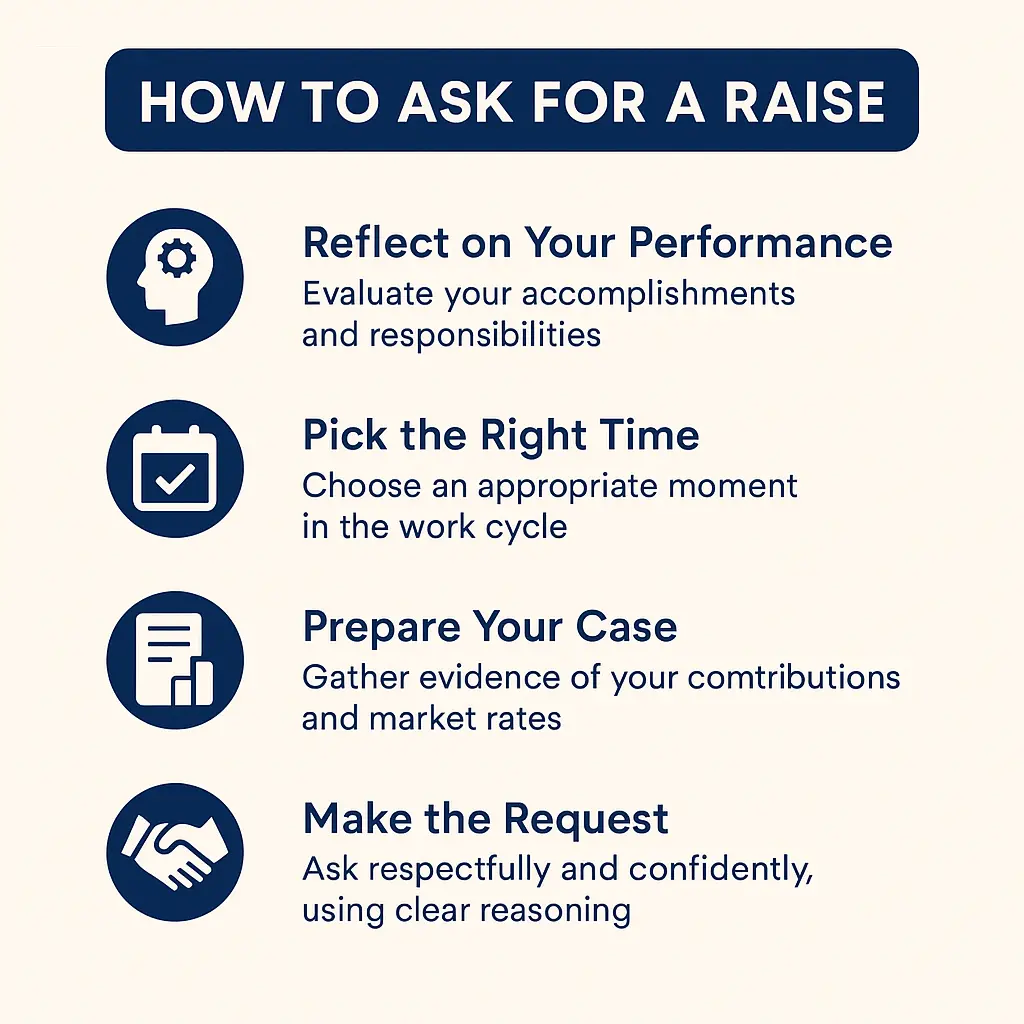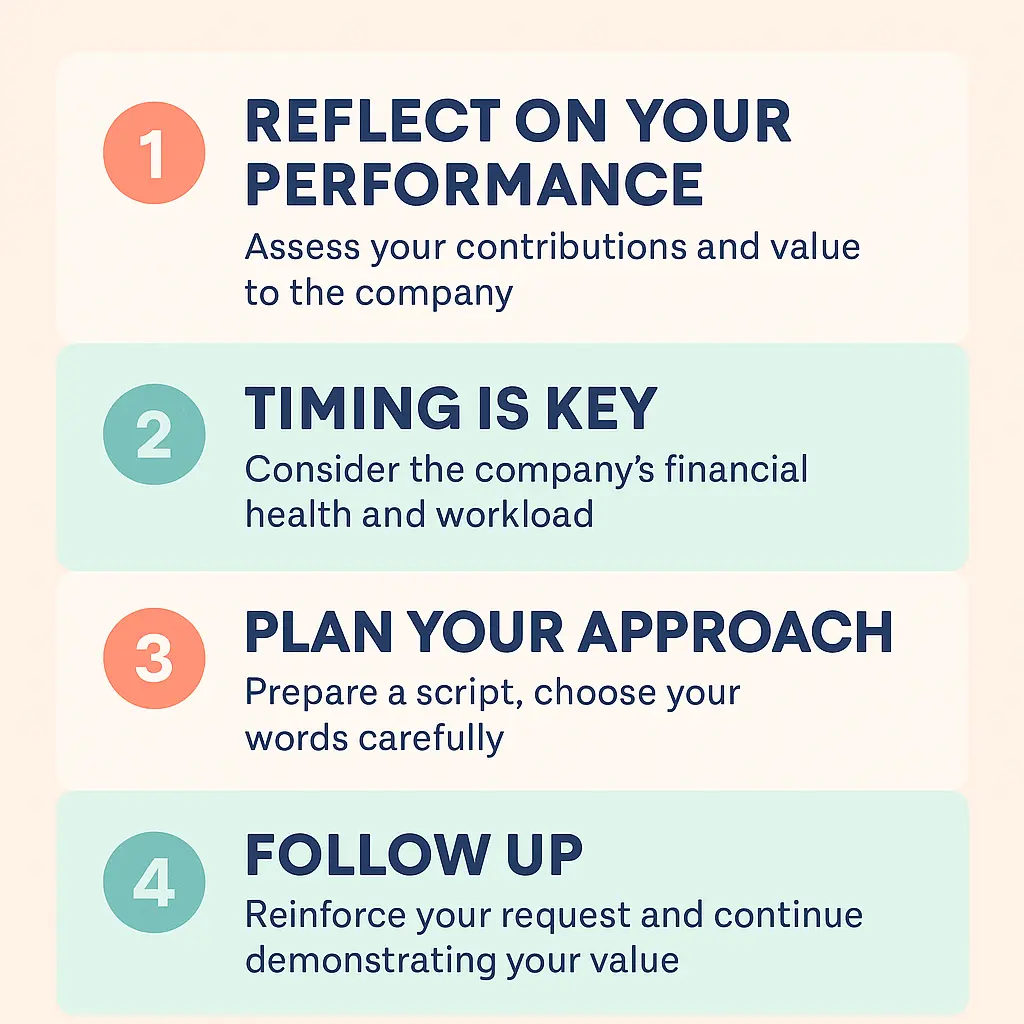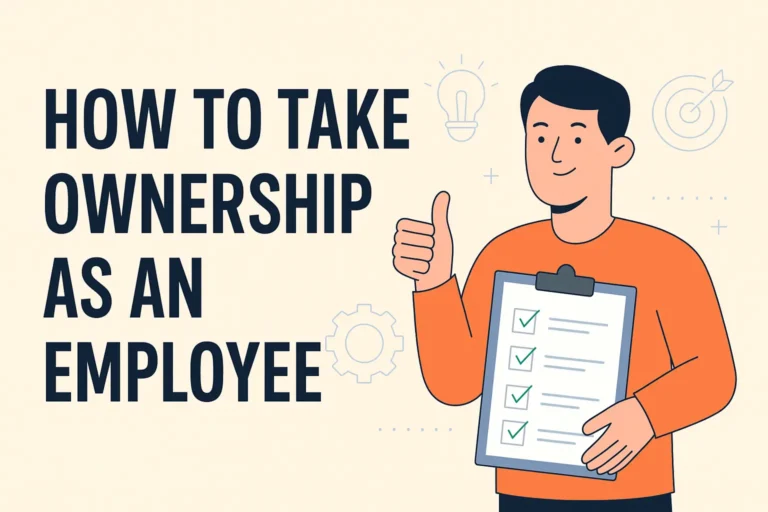How to Ask for a Raise: A Simple Guide That Gets Results

How to ask for a raise—it sounds simple, but saying those words can make anyone’s heart race. If you’ve been working hard, taking on more tasks, or crushing your goals, it’s probably time. Timing, confidence, and preparation are key. The good news? You don’t need to be perfect—just clear, respectful, and ready. This guide walks you through what works, when to speak up, and how to handle the talk without making it awkward. You’ve earned your moment—let’s make it count.
Raise Request Checklist
|
Step |
What You Need to Do |
Why It Matters |
|---|---|---|
|
Self-Reflection |
Think about how your role has changed |
Helps frame your raise as earned |
|
Document Contributions |
List specific wins and responsibilities taken on |
Gives proof to back your request |
|
Choose the Right Moment |
Time your request based on company flow and tone |
Increases chances of a receptive response |
|
Plan Talking Points |
Write down what you’ll say and rehearse |
Keeps you clear and confident |
|
Follow Up Respectfully |
Check back after a week or two, politely |
Shows professionalism without pressure |
How to Professionally Ask for a Raise
It doesn’t need to be a dramatic moment. Asking for a raise can be as professional as updating a client or submitting a report. But tone and timing carry weight. Speak like you’re confident in your work—not begging, not demanding, just stating facts with purpose.
Keep the meeting formal but friendly. It’s okay to smile, but get to the point early. Don’t go in circles. Most managers appreciate a direct approach. Something like: “I wanted to discuss my current compensation in light of the responsibilities I’ve taken on lately.”
That line opens the door, keeps it respectful, and still shows you’re serious.
Choose Your Words Carefully
Words stick. Some leave a solid impression, others just fall flat. So before you start, think it through. Avoid sounding entitled or vague. Skip phrases like “I think I deserve” or “Everyone else is getting paid more.” That just shuts things down.
Instead, speak to facts. “Over the past six months, I’ve led two key projects that brought in new clients. I believe it’s a good time to review my compensation.” See how that sounds? It’s calm. Clear. And hard to ignore.
Stay away from comparing yourself to coworkers. Keep the focus on your own work. People respect that kind of clarity.
Stay Calm, Polite, and Focused
You might feel nervous, but don’t let it show in a way that takes over the room. Breathe before you walk in. Stick to your key points. And remember, asking for a raise is a normal part of professional life—not a confrontation.
Keep your voice steady, your posture relaxed, and your words polite. That doesn’t mean being shy. It just means speaking with quiet confidence. Your tone should say, “I know what I bring to the team,” not “I hope you see it.”
If the conversation shifts or your manager seems surprised, don’t panic. Stay with your message. Sometimes people just need a minute to process.

Prepare What to Say When Asking for a Raise
Winging it doesn’t work well here. Go in with a plan. That means knowing your main points and having them in the right order. Start with your current role, list a few big contributions, and then introduce the raise.
This keeps your message organized. It also helps if the meeting moves fast—you won’t forget what you came to say.
Try writing your points down. Not a full script, just bullet points to guide you. That way, you don’t ramble, and your message stays strong.
Build a Short Script or Talking Points
You don’t need to sound robotic, but it helps to have a rough outline. Think of it like this: what would you say in one minute if you had to make your case?
Start with:
“I’ve taken on more responsibility over the last year, including leading the Smith project and training two new team members.”
Then:
“I’d like to talk about adjusting my salary to better reflect the role I’ve been playing.”
Keep it tight. You want it short enough to be memorable, but detailed enough to be clear. Avoid stuffing it with filler. Say what matters, and leave room for your manager to respond.
Practice With a Friend or Mirror
This step sounds small, but it works. Saying the words out loud helps you sound more natural later. Stand in front of a mirror and talk it through. Watch your body language. Are you fidgeting? Do you look away? These are things you can fix before the real meeting.
If you’ve got a trusted friend or coworker, run the conversation with them. Ask for honest feedback. Not on your worth—that’s already there—but on how you come across. Do you sound rushed? Too passive? Too nervous?
Even one or two dry runs can make a big difference when it’s time to speak for real.
Start with Self-Reflection
Before you talk numbers or schedule that meeting, pause for a second. Take a quiet moment, maybe over coffee or during a lunch break, and just think. Not about what you want, but why you want it. Are you asking because your bills grew, or because your responsibilities at work did? There’s a big difference. Asking for a raise based on personal need rarely lands well. What matters more is what you bring to the table.
Think about your role now compared to when you first joined. Have you grown? Are you the go-to person for tasks that used to be team efforts? Sometimes, we’re so deep in our routines that we forget how far we’ve come. This quick reflection isn’t just for confidence—it lays the foundation for your ask.
Understand Your Value at Work
This part matters more than people realize. You can’t expect a raise just for showing up—you earn it by showing impact. So how do you figure out your value?
Start with simple questions. What do people at work count on you for? Have your responsibilities grown beyond your job description? Maybe you’re the person who keeps projects on track, brings in new ideas, or handles customer complaints like a pro. That’s worth something. Actually, that’s worth a lot.
Think also about how your role fits into the bigger picture. Maybe your tasks don’t grab headlines, but without your work, the machine stops running. That quiet kind of value often goes unnoticed—until you point it out.
Review Your Achievements and Contributions
Now’s the time to gather receipts—not literal ones, but the kind that back up your story. Pull up old emails where your boss thanked you, project files with your name on them, or sales reports you helped improve. Be specific. Saying “I worked hard” won’t help your case. Saying “I handled four client accounts solo for two months and retained all of them” makes people listen.
Achievements don’t have to be massive. They just need to show that you’re consistent, dependable, and worth the investment. Even small wins, when stacked together, tell a powerful story.
And remember, it’s not bragging—it’s business. You’re not asking for a favor. You’re pointing out what’s already true.

Pick the Right Time to Ask for a Raise
Timing isn’t just about calendars. It’s about context. The way you time your request can swing the answer from “not now” to “let’s talk.”
Think about your manager’s workload. Are they swamped? Stressed? Mid-deadline? That’s probably not the time. On the other hand, right after a successful project—especially one where you played a key role—can be perfect.
Another smart time is during performance reviews. These moments already invite conversations about growth, feedback, and future goals. That makes them a natural fit for pay discussions.
But don’t wait for a golden ticket. If you’ve been contributing consistently and your role has evolved, that’s a sign to move. Sometimes, waiting too long makes the ask feel overdue instead of timely.
Best Times During the Work Year
Some parts of the year are just better than others. For most companies, budget planning happens toward the end of the fiscal year. That means late Q3 or early Q4 is prime time. Managers are looking ahead, reviewing team needs, and assigning numbers. Ask before the budget locks in—not after.
Also, consider your company’s rhythm. Just after bonuses are handed out or when the company hits a milestone can be promising moments. At those points, leaders are often in a mindset of growth, not restriction.
Avoid the slow months or financial downturns. Even if you deserve more, the answer might be no just because the timing isn’t right.
Signs Your Boss May Be Open to It
Watch and listen. Your boss might not say, “Hey, this is a good time to ask for more money,” but they’ll give clues. Maybe they’ve recently praised your work more than usual. Or they’ve started giving you bigger assignments. That often means trust has grown, and they’re seeing you in a bigger role.
Another sign? They ask your opinion in meetings or loop you in on high-level discussions. That’s a hint you’ve moved from “just an employee” to “valued contributor.”
If your boss has also mentioned budget updates or hinted at upcoming team changes, those can be openings too. It’s not about waiting for a neon sign—it’s about recognizing the little green lights and moving when the path feels right.
How to Ask for a Raise Over Email or in Person
Choosing how to approach your manager matters more than most people realize. Some prefer face-to-face talks—it shows confidence and makes the conversation personal. But there are moments when an email works better. Maybe your boss is rarely available, works remotely, or meetings always feel rushed. In those cases, writing it out helps get your point across without interruption.
The key is this: match your method to the environment. If your workplace culture is casual, a quick chat might be perfect. But in more formal settings, an email can give both sides room to think.
No matter which you pick, be clear, respectful, and focused.
When Email is Okay
Not every situation needs a sit-down. Email works when:
- Your manager is always in back-to-back meetings
- You want to organize your thoughts without pressure
- You’re opening the conversation before a scheduled review
- You’re working from another location or country
Still, it’s not about hiding behind a screen. Use email to request the conversation—not to drop your whole case into their inbox.
Example:
Hi [Manager’s Name],
I’d like to set up a time to talk about my current compensation, especially as my role has grown over the last few months. Please let me know when would be convenient for you.
Thanks,
[Your Name]
This message is simple, respectful, and opens the door the right way.
Sample Phrases and Examples
You don’t have to reinvent the wheel. Here are some simple lines that help keep things smooth:
Face-to-Face or Over a Call:
- “I wanted to talk about my salary. Over the past few months, my role has expanded, and I believe it’s time to revisit the topic.”
- “Based on the responsibilities I’ve taken on lately, I’d like to discuss an adjustment to my current compensation.”
Email Follow-Up:
- “Thanks for taking the time earlier. I really appreciate you hearing me out and considering my request.”
- “Let me know if there’s any more info you need from me to support the review.”
Short, honest, and to the point. That’s what works.
Timing matters
Raises are 30% more likely to be approved during performance review season, typically in Q4.
Common Mistakes When Asking for a Raise
Some things can throw the whole conversation off track, even if your performance is great. Here are a few traps people fall into:
- Making it personal: “My rent went up” or “I need more money” won’t help. Your manager can sympathize—but that’s not a reason for a raise. Stick to your work.
- Comparing yourself to coworkers: Saying “I know John makes more than me” only creates tension. Focus on your value, not someone else’s.
- Being too vague: “I’ve been working hard” doesn’t say much. Be specific about your wins.
Stay professional. That’s the tone that opens doors.
What to Avoid Saying
It’s easy to get emotional, especially if you’ve been waiting too long. But certain phrases kill the mood fast. Avoid:
- “I need a raise.”
- “I’ve been here for a long time, so it’s only fair.”
- “Others are earning more than me.”
These sound more like pressure than a professional request. Instead, talk about outcomes. Think: “Since taking over the onboarding process, I’ve helped reduce new hire ramp-up time by 30%.”
Speak from results, not feelings.
How to Deal With a “No”
Sometimes, even after doing everything right, the answer still comes back negative. That can sting. But don’t let it throw you off course.
First, stay calm. Don’t argue. Don’t react in frustration. Instead, ask for feedback. “Can you share what I need to work on to be considered for a raise in the future?”
This shows maturity and gives you a roadmap. It also keeps the conversation open—because the “no” might just mean “not yet.”
Then, write down what was said. Track your wins moving forward. Keep building. That way, when the time comes again, you’ll have even more to back you up.
What to Do After You Ask for a Raise
Once the conversation ends, the job isn’t done. In fact, what you do next can leave just as much of an impression as the meeting itself.
Stay professional. Don’t push for an immediate answer unless one’s offered. Let your manager process things. They may need to speak with others, check budget numbers, or simply give it more thought.
Then comes the wait. It might feel awkward, but don’t overthink it. This is where patience pays off. Keep your tone positive in daily interactions and continue doing your work with the same energy as before. Your attitude during this time quietly speaks volumes.

Follow-up Strategy
After a week or two, if you haven’t heard anything back, it’s okay to follow up. Keep it short and professional. A simple line like this works:
Hi [Manager’s Name], just checking in to see if there’s any update regarding our recent conversation about my compensation. I’m happy to provide any further details if needed.
This kind of message shows that you’re thoughtful and respectful of their time, while still keeping your request on the radar.
Make sure to follow up only once, unless invited to do otherwise. Over-messaging can tip the tone from professional to pushy—and that’s not where you want to land.
Keep Your Performance Strong
This step gets missed more than it should. After making the request, keep showing up like someone worth betting on. Work just as hard—maybe even harder. Show consistency, take initiative, and keep track of your wins quietly in the background.
Think of this period as your real-time reference check. It’s where your actions prove that the raise isn’t just deserved—it’s smart for the company, too.
And here’s something many forget: even after the raise, keep delivering. It’s not a finish line—it’s a new starting point.
Extra Tips for Nervous Employees
It’s normal to feel on edge before bringing up money. Many people hesitate, not because they don’t deserve more, but because speaking up feels unfamiliar. That discomfort? It’s more common than you think.
You’re not alone. Confidence builds with repetition, but it starts with action. You’ve already done the hard part—recognizing your worth. Now you just need a few mental tools to help get you through the ask.
How to Build Courage
Don’t wait until fear disappears. That moment rarely comes. Instead, take one small step. Write out your main points. Read them aloud. Then stand in front of a mirror and say them again. It might feel strange, but the more you hear your voice say the words, the more normal they sound.
Also, remind yourself: your manager probably isn’t shocked. People ask for raises all the time. You’re not being rude. You’re being fair.
One trick? Imagine you’re helping a friend who’s done great work. You’d tell them to speak up. Now treat yourself with the same respect.
Quick Mindset Shift Tricks
Try this before the meeting: Instead of saying “I’m nervous,” say “I’m ready.” It’s not magic—but it adjusts your brain. That one-word change shifts the feeling from fear to focus.
Another fast shift? Think about the worst that can realistically happen. Your manager says no. That’s it. You still have your job. You still have your skills. That simple thought deflates most of the pressure.
Take a walk before your meeting. Breathe. Say your lines once more—and step in like someone who believes in their own work.
Because, honestly? You’ve got every reason to.
Conclusion
Asking for a raise doesn’t need to be awkward or intimidating. When you understand your value, time your request wisely, and speak with honesty and clarity, it shifts from a scary moment to a natural part of your growth at work. Think of it this way: your performance earned the right to start the conversation. You’re simply putting words to the work you’ve already done.
Take the first step with calm confidence. Be ready to support your request, stay open to the response, and keep moving forward. Because your growth at work should reflect not just your time—but your contribution.
FAQs – How to Ask for a Raise

About the Author
Jonathan Savage is a leadership strategist who helps teams boost performance through clarity and structure. At SmartSuccessGuide.com, he shares proven frameworks for building focused, high-performing teams that deliver real results.






